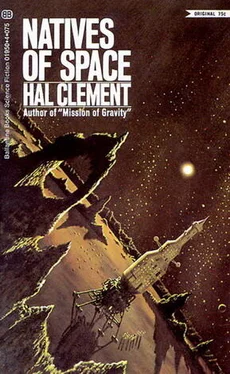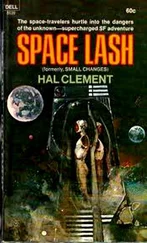Talker, naturally, had suspicions of his own arising from this suggestion. Unlike Boss, however, he was not blinded by them; and remembering that he had already divulged probably the most important characteristic of the weapons — the fact that they were projectile — throwers — he answered after a moment, “Come, then, and see.”
It was characteristic of the herald that he tendered the invitation without consulting Boss, or even mentioning to Kirk the objections that the commander would probably raise. He had a contempt, born of long experience, for the captain’s resolution, and it never occurred to Talker to doubt his own ability to override any objections. His confidence was justified. If Boss had possessed a heart, instead of a system of valves and muscle rings along the full length of his arterial and venous systems, he would probably have had heart failure when Talker coolly announced his intention of displaying the ship’s armament to the Earthling; he was still sputtering half-formed thought waves as he followed the pair toward the air lock. Talker had merely explained the reason for his action, and acted; Boss would never have admitted, even to himself, that he considered Talker’s opinion superior to his own, but he invariably accepted it as though it were.
He was firmly convinced that his own genius was responsible for their successes to date, and Talker saw no reason to disillusion him.
Kirk learned little from the ships guns, though the sighting apparatus would have given an artilleryman hours of ecstasy. The weapons themselves were simply ordinary-looking small-caliber, smooth-bore cannon, but with extremely ingenious mountings which permitted them to be loaded, aimed, and fired without losing air from the ship. The turret rooms were divided by bulkheads into two parts, one containing the gun and auxiliary mechanisms, and the other, to Kirk’s surprise, piled high with metal cylinders that could be nothing but projectiles. He picked up one of these, and found it to be open at one end, with an empty hollow taking up most of its interior. Talker, who had made explanations from time to time, began to write again.
“We need material to manufacture the filling of that projectile,” were his words. “Empty, it is useless for any purpose whatsoever.”
“And when it is full — “ asked Kirk.
“The shell penetrates the walls of a ship, leaving only a small hole which is promptly sealed by the material between the inner and outer hulls. The projectile is ruptured by a small explosive charge, and its contents evaporate, releasing an odorless gas which takes care of the crew. The ship can then be towed to a planet and looted without opposition and without danger — if you can reach a habitable world unseen.”
“Why can you not use an explosive charge which will open a large hole in the hull, and do your looting in space?” asked the man.
“Air extends only a short distance outward from each world,” explained Talker, his respect for the Earth-man’s knowledge dropping about fifty points, “so it is impossible to leave a ship or change ships while in space. An explosive shell, also, would probably destroy much of the interior, since the hull of a ship is far stronger than the inner partitions, and we want what is inside as nearly intact as possible.”
Kirk waited rather impatiently for the herald to finish scrawling this message, and snapped, “Of course, I know about the airlessness of space; who doesn’t? But have you no protective garment that will permit you to carry air and move about more or less freely, outside a ship?”
“Many attempts have been made to devise such a suit,” was the answer, “but as yet there is nothing which can be trusted to permit all our limbs to move freely, carry air to our breathing orifices, and possess air-tight joints and fastenings. I can see that there might be very little difficulty in designing such a garment for your simply constructed body, but Nature built us with too many appendages.”
Kirk said nothing as he half-crawled down the low corridor to the air lock, but he did a lot of thinking. He was reasonably sure that most of his cerebral operations were indecipherable to the alien, though it was chiefly mental laziness which kept him from making any particular effort to couch his thoughts in nonvisual terms — such an effort would have been a distinct bar to constructive thinking, in any case. The herald’s story, while strange from Kirk’s Earthly point of view, was certainly not impossible; the conditions of life he had described had, in large measure, existed on Earth at various times, as the Earthling well knew. Kirk had gained considerable appreciation of Talker’s rather cynical character, and had been somewhat amused at the unconscious egotism displayed by the herald.
The Sun was low in the west when the group emerged from the air lock, and a stiff northeast wind made its presence felt at the top of the bank, out of the shelter of the hull. Kirk looked at the sky and forest for a few minutes, and then turned to Talker.
“I will return to my camp now, and eat. You have given all the help you can, I guess. I will try to solve the problem tonight. I can make no promise of success, and, even if I do discover what your chemical is, there is the possibility that I will still fear to trust you with it. Your people are peculiar, to me; I don’t pretend to understand half of your customs or ideas of propriety, and my first consideration must be the safety of my own kind.
“Whatever happens, I cannot remain much longer in the territory. You may not be acquainted with the seasonal changes of this planet, but you must have noticed the drop in temperature that has been evident at night the last week or two. We are located almost upon the Arctic Circle” —
Kirk pictured mentally just what he meant — “and I could not live very far into the winter with my outfit. I should have returned to my own country several weeks ago.”
“I cannot control your actions, even if I wished to do so,” answered Talker. “I can but hope for the best — an unusual situation, all around, for me.”
Kirk grinned at the herald’s wry humor, turned, and strode away in the direction of his camp — he had not moved it closer to the ship, because of the better water supply at its original location. As he walked, the grin melted quickly from his features, to be replaced by the blank expression which, for him, indicated thought. He had no idea of what he should do; as he had told the herald, the man’s first consideration was his own kind, but he wanted to believe and trust in the alien, whom he had come to like.
It was evident that Talker had not exaggerated the seriousness of his own position. Kirk had seen members of the crew moving painfully about their duties on board the ship, and had seen one of them collapse as the horny exoskeleton of his absurdly thin legs gave way under a body weighing more than three times what it should have. On the other hand, a crew of Earthmen under such conditions would have left long since, weapons or no weapons. Kirk found himself unable to decide whether the stubbornness of these creatures was an admirable trait, or an indication of less worthy natures. It occurred to him, fleetingly, that their idea of a “worthy” trait probably differed widely from his own.
Possibly, if the man decided to refuse aid to the strangers, he could quiet his conscience by comparing them to children refusing to come in out of the rain until mother promised them some candy — but a scientist, working overtime in his laboratory, could be described by the same simile, and Kirk knew it. No, the need was surely real enough to them.
And why should they want to attack mankind? Earth was useless to them, as a dwelling place; if, as they claimed, their own king were against them, only fools would make such an attempt, however armed. And Kirk was not impressed with the gas guns of the aliens — they were, even he could realize, worth absolutely nothing except in the confined space of an ether ship. On the other hand, Talker might have stretched the truth beyond its yielding point; and the “king,” whom he might still be serving, would not need excuses such as the possible utility of a world in order to attack it, unless he differed greatly from Earthly rulers. The chance to extend his dominions would be motive enough.
Читать дальше












